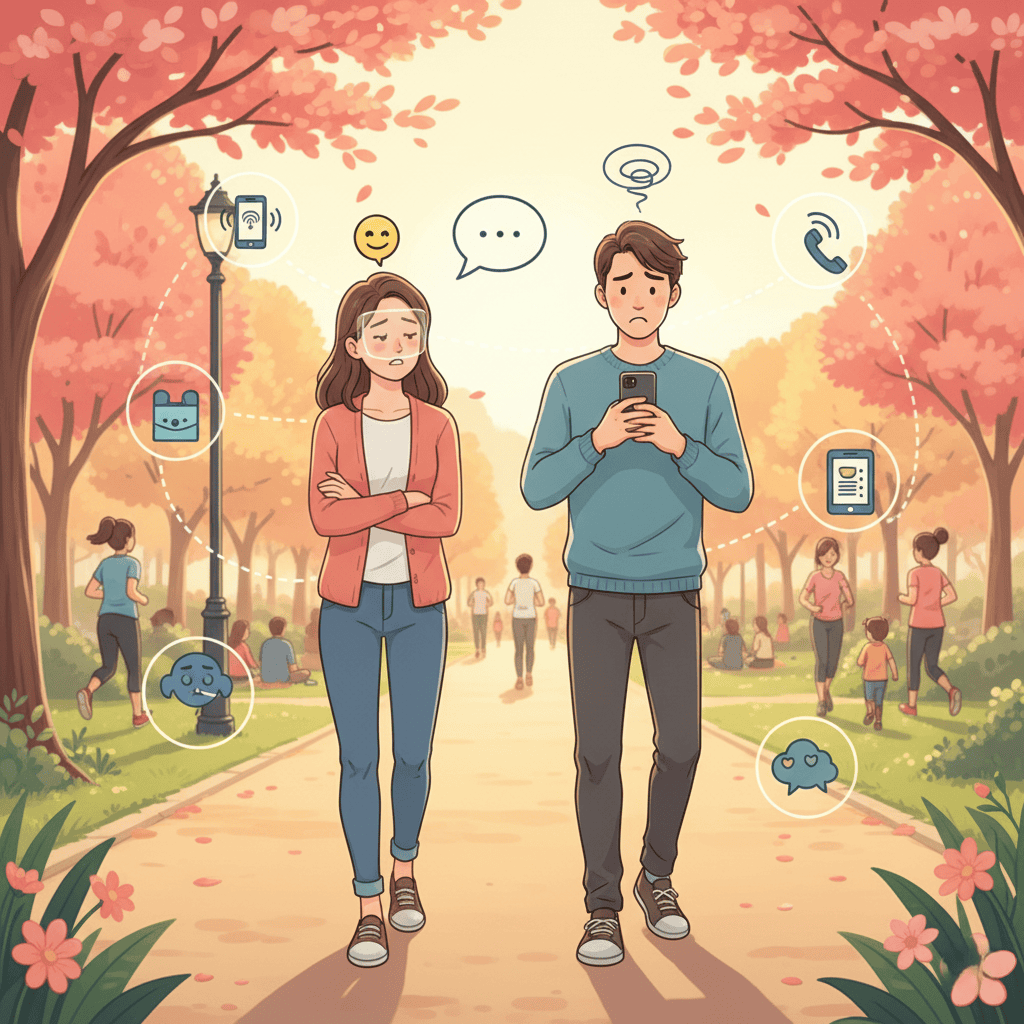Where Every Connection Becomes a Bond

You notice them at dinner. Sitting across from each other, not really looking at each other. One scrolling on their phone while the other stares into space. They’re physically present but emotionally miles apart.
Or you catch them at a party. He’s on one side of the room with his friends. She’s on the other side, talking to yours. They don’t exchange glances. They don’t check in with each other. They navigate the event as separate people who happen to have arrived together.
There’s something about unhappy couples that becomes visible in public—even if they’re not saying anything overtly wrong.
The truth is, unhappiness in a marriage leaves a signature. It’s written in body language, in the small interactions (or lack thereof), in what they choose to say and do when others are watching. And while every couple might hide some dysfunction privately, the deeply unhappy ones leak their unhappiness into public spaces in predictable, recognizable ways.
Let’s explore the seven most telling public behaviors of unhappy couples.
1. Their Bodies Are Physically Distant
This is one of the most visible signs, and relationship experts consistently point to it as a major indicator of unhappiness.
Happy couples in public still touch. They hold hands. She rests her head on his shoulder. His hand finds the small of her back as they walk through a door. They sit close together on a couch. Their bodies are oriented toward each other.
Unhappy couples maintain distance. There’s a physical gap between them, even when sitting right next to each other. They don’t hold hands. They don’t touch. When one tries to touch the other, there’s a subtle flinch or pullback.
Their bodies have become strangers to each other. And bodies don’t lie. When you’re unhappy in a relationship, your physical body creates distance as a reflection of the emotional distance.
2. They Never Make Eye Contact With Each Other
When you watch them interact, you notice something odd: they rarely look at each other.
One is talking, and the other is looking at their phone, or past them, or at someone else in the room. When they do look at each other, there’s often a flatness—no warmth, no spark, no recognition.
Eye contact is where intimacy lives. It’s how we signal to someone: “I see you. You matter to me.” When couples stop making eye contact, they’re saying: “You’re no longer visible to me.”
This is particularly striking when you compare it to how they interact with other people. They make eye contact with friends, with strangers, with the waiter. But with their partner? The eyes slide away.
3. They Make Jokes About Their Spouse (Or the Marriage) in Front of Others
This one cuts deep because it’s disguised as humor.
“She never lets me do anything.” “He’s such a slob.” “She’s always spending money.” “He never helps around the house.” These jokes come with a smile and a laugh, but underneath is contempt.
Contempt is one of the most destructive forces in a relationship, according to relationship researcher John Gottman. It’s the belief that your partner is beneath you—unworthy of respect. And when couples feel contempt, they often express it through jokes that belittle their partner in front of others.
The “joke” is actually an insult disguised. And the audience laughing validates it—which makes it even more hurtful.
Pay attention to couples who constantly demean each other through humor. That’s not playful banter. That’s contempt masquerading as comedy.
4. They Don’t Engage With Each Other—They Exist Separately
At a social gathering, you notice they navigate completely separately.
He goes to talk to his friends and never checks on her. She mingles without any awareness of where he is or what he’s doing. They don’t introduce each other to people. They don’t stand together as a unit. They’re two individual people who happen to have a marriage certificate.
Happy couples, even when doing separate things at a party, maintain awareness of each other. They make eye contact across the room. They come back to each other periodically. They function as a team with autonomy, not as individuals who’ve been legally bound.
Unhappy couples seem to be deliberately avoiding each other. And that avoidance is deafening.
5. There’s a Stark Shift in Their Behavior the Moment They’re Alone
This is the paradox that many people notice: they’re decent in public, but completely different when the door closes.
One partner is charming, engaged, and nice while at dinner with friends. But the moment you’re alone with them, their demeanor changes. They become cold, withdrawn, or sharp. The warmth disappears. The mask comes off.
This behavioral split is often a sign of emotional abuse or deep resentment. They care what others think, so they perform. But with their spouse, there’s no performance. The contempt, the anger, or the indifference emerges.
It’s one of the clearest signs that what you’re witnessing in public is theater—and the real relationship is far more toxic.
6. They Complain About Each Other to Others
Instead of resolving issues privately, unhappy couples air their grievances publicly.
She tells you (within earshot of him) all the things he’s not doing right. He makes comments to his friends about her spending habits or her appearance. They use third parties as an audience for their resentment.
This serves multiple functions: It allows them to vent frustrations they’re not addressing directly. It allies them with outsiders against their partner. It keeps them emotionally distant by turning their relationship into a spectacle.
Happy couples might occasionally mention a minor annoyance. But truly unhappy couples seem to use social settings as a platform for publicly lambasting their partner.
7. They Seem Relieved When They’re Apart
Perhaps the most telling sign: they seem happier when they’re not together.
She lights up when talking to her friends without her husband. He seems more relaxed and animated when his wife isn’t there. There’s a palpable relief when they separate.
When you’re happy with someone, their presence energizes you. You want to be near them. But when you’re unhappy, their presence drains you. And the absence of their presence feels like relief.
This is often the clearest sign of all—not what they’re doing in public, but what they’re feeling when they’re apart.
What This Actually Means
Unhappy couples leak their unhappiness into public spaces because emotional disconnection can’t be fully contained. Our bodies, our tone, our choices all reveal what we’re trying to hide.
You can pretend to be happy for a dinner. You can perform contentment for a party. But sustained unhappiness changes how you relate to your partner fundamentally.
If you’re recognizing these patterns in your own marriage, understand that this is a wake-up call. These public behaviors are evidence that something is deeply wrong.
If you’re witnessing these patterns in someone else’s marriage, understand that what you’re seeing is likely just the tip of the iceberg. The unhappiness is probably far more significant in private.
The Path Forward
Unhappiness in a marriage is not permanent, but it requires acknowledgment and intervention.
If you’re leaking these signs into public, it’s time to have difficult conversations with your partner. It’s time to consider therapy. It’s time to ask yourself: Do I want to rebuild this, or do I need to let it go?
Because every day you spend in a marriage where you’re unhappy is a day you’re not spending in the life you actually want.
And your body, your voice, and your choices are already telling that story in public—whether you want them to or not.




